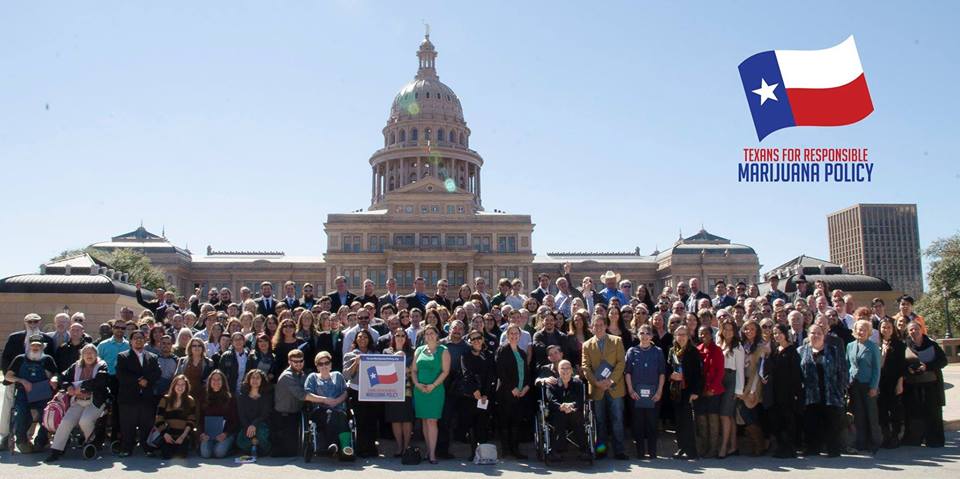Marijuana Policy Reform in Texas
By Philip Martin
Card 1:
28 states have at least one marijuana policy law in place. Texas is one of them (sort of).Card 2:
74% of Texans Support Marijuana Policy ReformCard 3:
Enforcement of Texas' Marijuana Laws Unfairly Target MinoritiesCard 4:
At the County Level, Support Intervention Programs Over JailCard 5:
Statewide Goal: Make Possession of a Small Amount of Marijuana a Ticketable OffenseCard 6:
Texas Passed a Limited Medical Marijuana Law in 2015. It’s a Start, But It’s Not Nearly Enough.Card 7:
Texas Medical Marijuana Laws Should Include Patients with Cancer, PTSD, and Other Debilitating Conditions.Card 8:
The Organizations You Need to Know to Get Marijuana Policy Reform Passed in TexasCard 1 of 8
28 states have at least one marijuana policy law in place.
Texas is one of them (sort of).
When you hear someone talk about marijuana policy reform, they are referring to one of three types of policies:
Reducing criminal penalties
policies typically involve removing jail time for small possession of marijuana (currently law in 19 states)Medical marijuana
policies that let those who are sick purchase marijuana with a note from their doctor (currently law in 23 states)Retail market marijuana
policies that allow marijuana to be sold like alcohol (currently law in 4 states)
The map below from the Marijuana Policy Project – a major grassroots and lobby organization – shows the breakdown of where these laws are enacted by state:
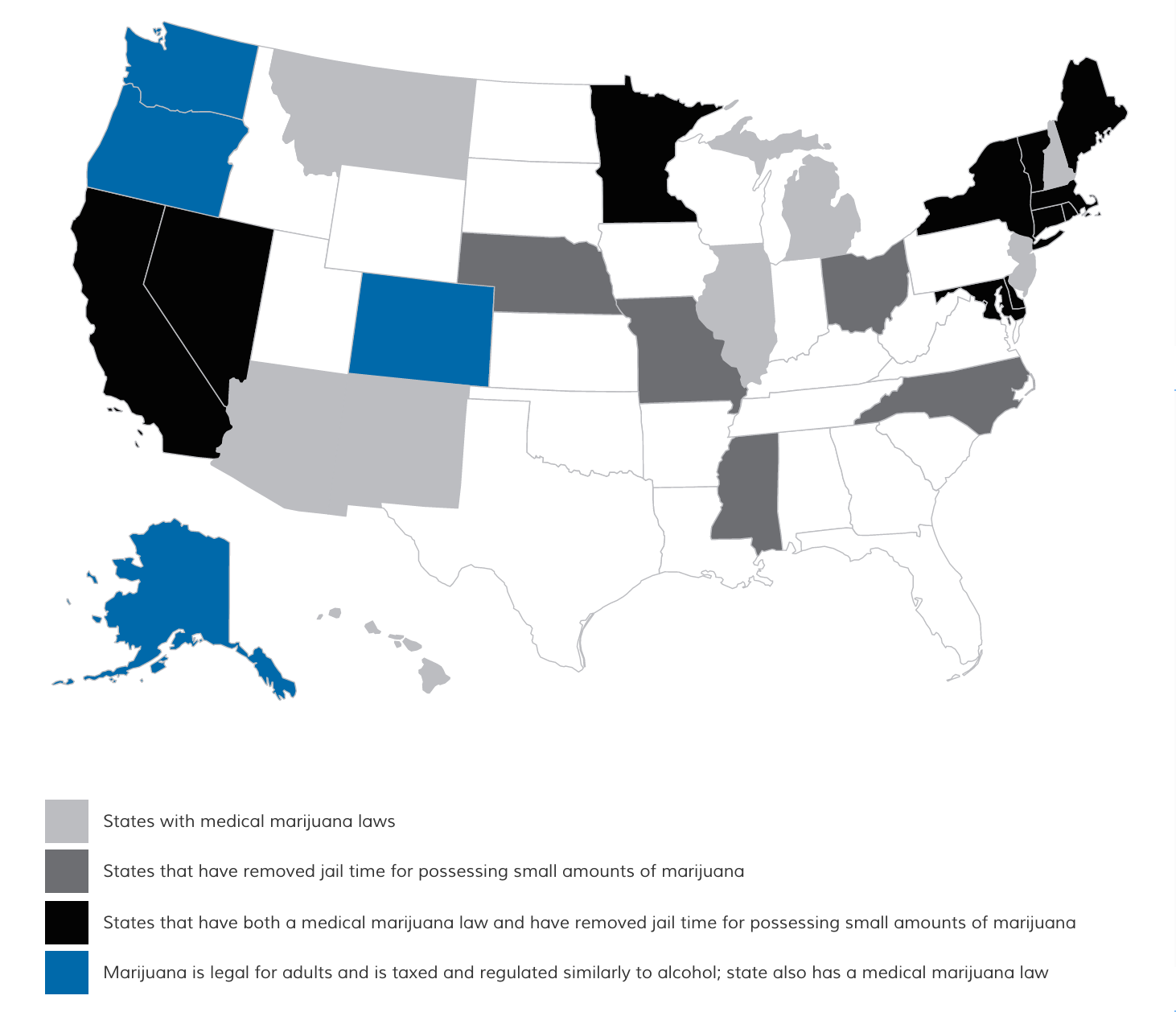
National attention usually focuses on retail market marijuana – on states like Colorado that allow marijuana to be manufactured and sold like alcohol.
But it’s the first two policies – reducing criminal penalties and comprehensive medical marijuana – that are the focus of organizations and activists in Texas.
Take Away
Our state has a very limited medical marijuana program, but until we build on that progress and pass more comprehensive reforms, it will be hard for us to count ourselves among the other 28 states that have taken greater steps for reform.
Card 2 of 8
74% of Texans Support Marijuana Policy Reform
In late 2015, a poll from the Texas Lyceum found that 74% of Texans support reducing penalties for small possession of marijuana. The chart below, from the Lyceum, shows the breakdown:
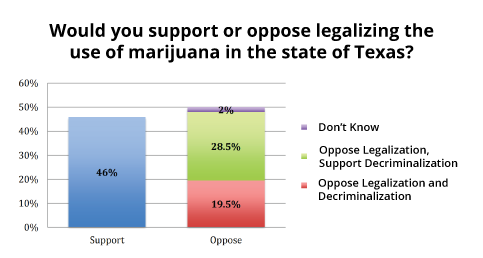
Three years ago, in 2013, a PPP poll found that 61% of Texans favored reducing penalties for small possession of marijuana. Then a poll from the University of Texas at Austin and Texas Tribune found that as many as 68% of Texans supported the policy.
For a link to all polling information on marijuana in Texas, visit the Texas Polling Center.
Take Away
As public support for action continues to grow, it will become harder and harder for elected officials to ignore this critical policy issue.
Card 3 of 8
Enforcement of Texas' Marijuana Laws Unfairly Target Minorities
Texas’ current law on possession of small amounts of marijuana is pretty straightforward:
Possession of less than two ounces is a Class B misdemeanor. Jail time can be up to 180 days with a fine of up to $2,000.
Polling has shown that most Texans agree that a first-time offender caught with a joint at a concert shouldn’t go to jail – for a number of reasons:
Future employment jeopardized
It makes it harder for that person to find work, pay taxes, and fully integrate into societyWrong use of law enforcement time
Booking someone for a joint can take up to four hours. Meanwhile, 90% of all reported burglaries — which include home invasions — and 88% of all motor vehicle thefts went unsolved by law enforcement.Too expensive
Texas spent $734M on 72,000 marijuana-related arrests in Texas, almost all of them low-level offenses.
The policing of these laws disproportionately impact Texas communities of color. Latinos in Texas have been unfairly targeted for decades. Black Texans are arrested for marijuana possession at least four times more often than whites, even though usage rates among the groups are the same.
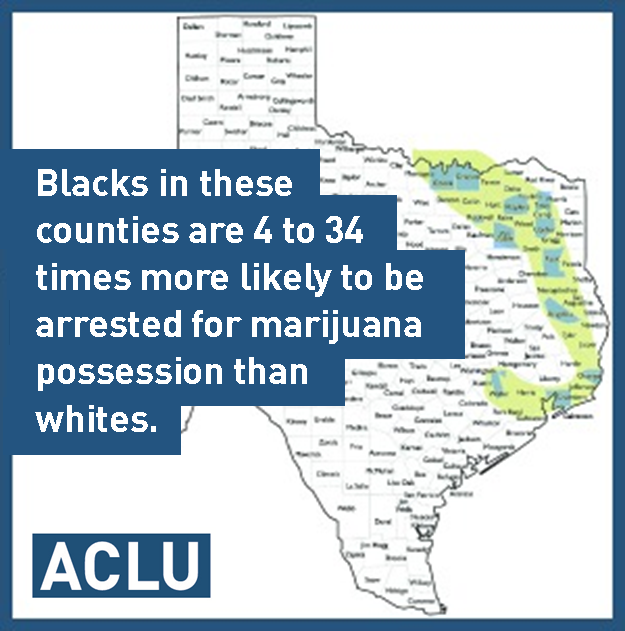
Take Away
Marijuana reform laws will improve Texas' criminal justice policies by ending the unfair targeting of Blacks and Latinos and committing our law enforcement's time and resources to legitimate matters of public safety.
Card 4 of 8
At the County Level, Support Intervention Programs Over Jail
“First Chance Intervention Program”
First used in Harris County, this program allows first-time offenders to avoid jail completely, saving money for the county and ensuring that nonviolent offenses don’t contribute to the school-to-prison pipeline. The idea is also starting to gain traction in Travis County.“Cite and Release”
allows local officers to issue citations for people they stop for small possession to appear in court, so they don’t have to take them to jail. Offenders would still have to appear and face stiff criminal penalties. Though the law allowing cite and release has been in place since 2007, only a few counties have adopted it so far – though Dallas County is currently considering this approach.
Take Away
Until the state adopts marijuana reform laws, Texas counties have options to immediately save money and improve local criminal justice practices.
Card 5 of 8
Statewide Goal: Make Possession of a Small Amount of Marijuana a Ticketable Offense
That was the policy imagined by State Rep. Joe Moody (D – El Paso) – whose bill making small possession of marijuana a ticketable offense successfully passed out of the Texas House Committee on Criminal Justice last session.
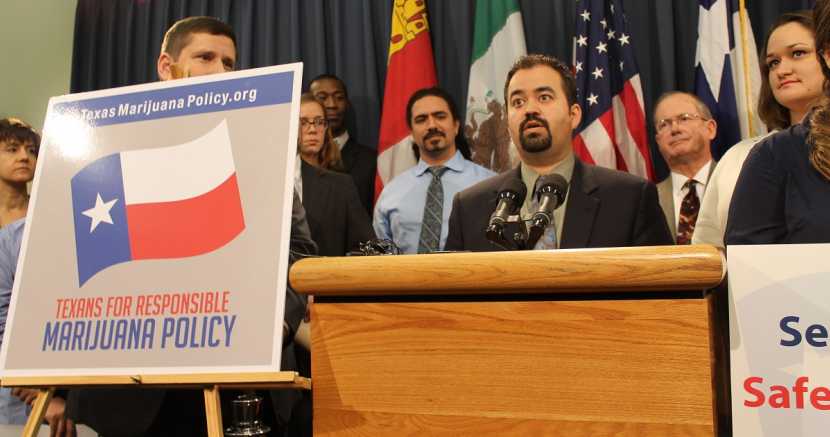
Here’s what he had to say about the bill in an interview we had with him last year:
In Texas, in the past, if there’s something we don’t like it becomes a crime. Every Class C traffic ticket you can think of is a crime.
A lot of states have civil sanctions for a myriad of things. Texas does not. The only policy that’s even comparable is something like a red-light camera violation is a civil sanction. And that’s not a statewide effort – that’s local entities even given the authorization to do it if they want to do it. So moving to civil penalties statewide [in HB 507] is really a first of its kind.
This policy change would allow police to spend more time solving serious crimes like robbery and assault, prioritizing the time and effort of law enforcement where it is needed most.
Take Away
Rep. Moody has pledged to work aggressively on the law when the Texas Legislature meets again in 2017.
Card 6 of 8
Texas Passed a Limited Medical Marijuana Law in 2015.
It’s a start, but it’s not nearly enough.
In 2015, Texas passed the “Compassionate Use Act.”
The law created a limited medical marijuana program that allows Texas to manufacture, test, and distribute CBD-oils, an extract of the marijuana plant that only has trace amounts of THC – the psychoactive component that is associated with a “high.” The law only allows doctors to prescribe the oil to patients with intractable epilepsy.

But Texas’ Compassionate Use Act is also an example of how CBD-only laws aren’t really medical marijuana laws, as the Drug Policy Alliance recently explained:
In some states, the only way medical marijuana is going to get its foot in the door is through the strictest of incrementalism. And, preventing access to an effective, safe and natural medicine for families in those states is of course, not a preferred outcome.
But, what about the children and adults with cancer, HIV and other serious illnesses in those states whose use of THC rich medicine might ease the nausea and pain associated with their treatments?
The adoption of CBD-only legislation might be a way to start the conversation in some states, but it should not be the end.
Take Away
The current law unnecessarily limits what doctors can prescribe, and who they can prescribe it to. However, it does provide a foundation the state can build from going forward.
Card 7 of 8
Texas Medical Marijuana Laws Should Include Patients with Cancer, PTSD, and Other Debilitating Conditions.
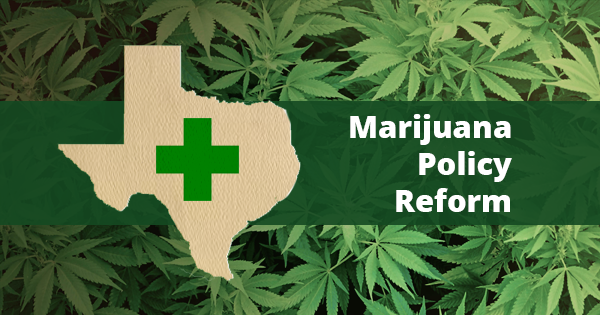
In 2015, Rep. Marisa Márquez and Sen. José Menéndez filed legislation to create Texas’ first comprehensive, full-scale medical marijuana program. It was the first time a bill of this scope was ever filed in Texas. Their bill would have allowed qualified patients, once they have received a doctor's note and registered with the state, to purchase and/or grow medical marijuana from a licensed dispensary.
In a recent interview we had with Sen. Menéndez, he talked about his hopes for the bill in the future:
Next session, our bill will look much different because it is going to build upon the law that already passed. By doing so, rather than starting from scratch, we can increase the amount of THC allowed in the medicinal cannabis and increase the amount of diseases the state authorizes that can be treated under the law.
For more information, read our full explainer of the law below.
Take Away
Educating lawmakers about medical marijuana - how it works in other states, and what the law would look like in Texas - is a top priority for advocates in 2017.
Card 8 of 8
The Organizations You Need to Know to Get Marijuana Policy Reform Passed in Texas
Our organization – Progress Texas – is the only progressive organization in Texas supporting marijuana policy reform. In the most recent legislative session, we built and created online advertising for an online action that generated more than 25,000 emails to Texas legislators.

We are also part of the fast-growing, twenty-eight member Texans for Responsible Marijuana Policy coalition. With organizations like Texas NORML, Marijuana Policy Project, and Republicans Against Marijuana Prohibition (RAMP), our coalition spans the political spectrum in pursuit of one simple goal: advance sensible marijuana laws that the people of Texas already support.
It’s not often that Texans of every political background agree on an issue. Marijuana policy reform gives us that opportunity, and we look forward to working with communities across the state to make that opportunity a reality.
To learn more about our coalition and the work of all its organizations, please visit the Texans for Responsible Marijuana Policy website – and be sure to follow us on Facebook.
